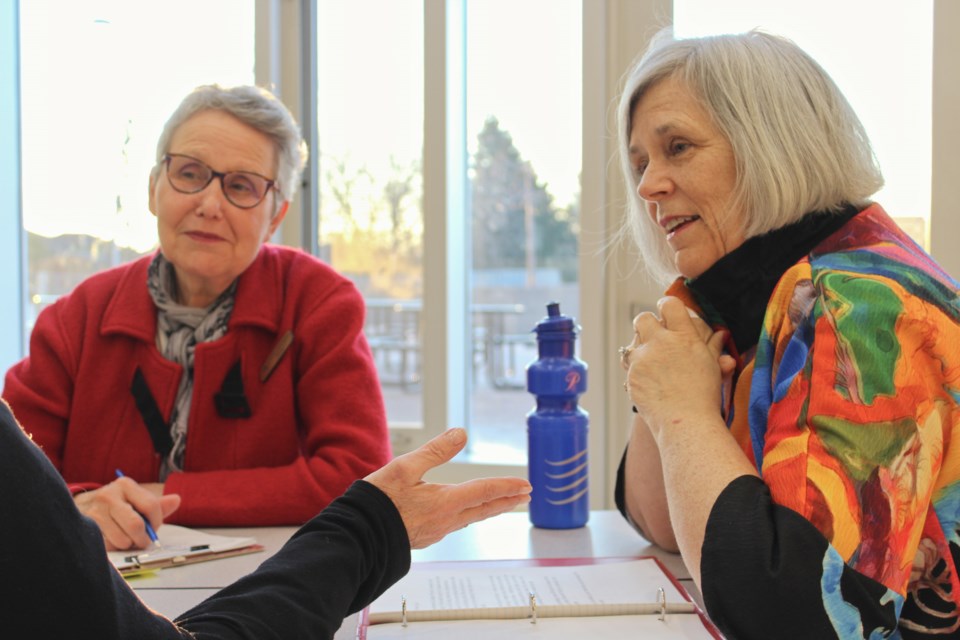Women represent just over 16 per cent of the candidates running for mayor and ward councillor positions in Orillia's Oct. 24 municipal election.
And that's "disappointing," laments current Orillia councillor Pat Hehn, who is not seeking re-election after serving back-to-back terms on council.
Nominations closed last Friday with a total of 30 candidates vying for the nine positions — just five of them women.
There are no women running to be mayor in Orillia this year, even with Steve Clarke not seeking a third term.
There is a single female candidate in each of Ward 1, Ward 2 and Ward 3 — among the 21 total candidates in those wards. There are two women among the six candidates in Ward 4.
Hehn, whose mom was an alderman (the forerunner to the councillor position) in Orillia many years ago, has long advocated for women to become more involved in local politics, stressing they bring a "much-needed" perspective to discussions at city hall.
She believes there are a few reasons why so few women enter politics.
"I don’t think that women have the same confidence that they can do the job and, of course, they are just as competent as men," said Hehn.
"Several years ago I had the pleasure of meeting with Kathleen Wynne to discuss trying to get women interested in running," recalled Hehn. "She said that if you ask a man, he will often entertain the thought that it is something he could do, whereas a woman has to be approached many times."
Hehn, who was the driving force behind the creation of North Simcoe Victim Services — and its first executive director — before becoming a city councillor, also said raising money seems to be an issue for some women.
"Women find it more difficult to fundraise. I thought I was asking for money so I could have a job," she explained. "It was difficult and, municipally, there are no tax receipts."
But the biggest issue may be social media, she stressed.
"You have to have a pretty thick skin to withstand some of the comments. Women would say that they didn't want their kids reading some of that stuff and I didn't blame them," she said.
"People can be pretty nasty, too. I think that they are more likely to try to bully a woman than they are man," she said.
Despite that, she said she is proud of the role she played on council over the last eight years.
"On the positive side, I know I was a role model for some younger women. If I could do it, so could they," she explained.
"I know that I influenced some of the legislation that was passed in the last eight years. I was able to make a difference in people’s lives and that is the most important part," she said.
Geoffrey Booth, a political science teacher at Georgian College’s Orillia campus, notes that Association of Municipalities of Ontario (AMO) numbers show that more women in Ontario are running for local councils — 27 per cent of the total pool of candidates were women in 2018, an increase from 24 per cent in 2014.
“This change is incremental and I think you’re going to see that trend continue as women realize first of all that they can do this and that they can be successful at it,” he said. “It’s one thing to say anybody can run for office, but if everybody running for office is a white guy in a suit, it makes it a little bit more perceptually difficult for your brains to put yourself in that position.
“It’s about expectation and whether you see yourself in politics.”
Booth conceded there are still traditions in place that can make it difficult for women to run for office.
“For example, family,” he said. “I think there’s just a whole lot more expectation on women to run the household. I’m not saying it’s good or it’s bad.”
But there are examples of women succeeding on a large scale in Ontario’s municipal elections.
Hazel McCallion was Mississauga’s mayor for 36 years before retiring in 2014, for instance. Orillia has had two female mayors: Isabel Post and Pat McIsaac.
AMO also says 42 per cent of women running in contested elections in 2018 were successful, while only 37 per cent of men running in contested elections were successful that year.
But that’s not the point, said current Barrie city councillor Natalie Harris, who has opted not to seek re-election.
“It’s a toxic job,” she said of being a councillor. “And I don't think it's OK that we keep condoning this toxicity because ‘we are elected officials.’
“In fact, I am just waiting for the hate that will come in my direction after this article is posted. It’s a given. It's too bad,” she said. “Many amazing women will not enter the political ring because they see what other female politicians have experienced. As humans we don't always have to agree, in fact, we shouldn't always agree — the beauty of democracy.
“But death threats and harassment are always unacceptable, regardless of your title.”
-- With files from Bob Bruton
